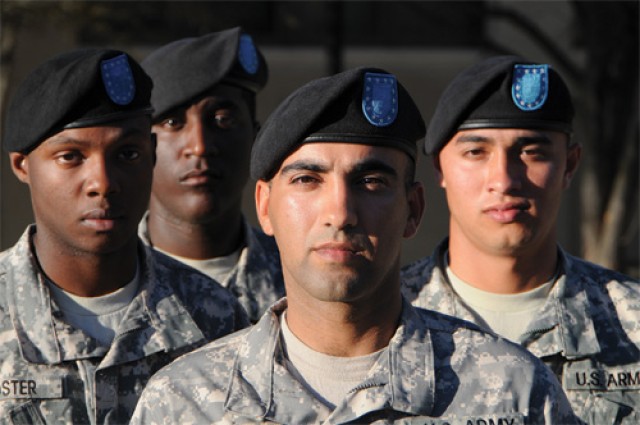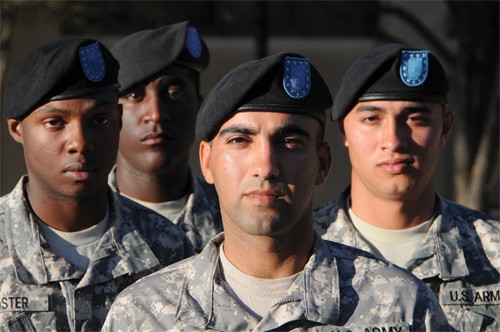FORT LEE, Va. (Nov. 5, 2010) -- One can acquire everything in solitude but character.
- Stendhal
If the statement by the 19th-century French writer suggests that character is built through deed and habit then Spc. Mazin Mozan has done more than enough to fulfill his role as a Soldier.
Mozan, a former Iraqi citizen, has endured a progressively trying journey that forced him from a life as an ordinary Iraqi citizen to one that is under constant threat of violence because he is defiantly supportive of Coalition efforts to support noncombatants in his homeland.
"My belief is strong," said the 28-year-old immigrant, former interpreter and now Soldier in the U.S. Army. "I'm doing the right thing."
Mozan graduated last week from the Quartermaster School's automated logistical specialist course. The Company A, 244th QM Battalion, 23rd QM Brigade advanced individual training Soldier describes the "The right thing" as "helping civilians and innocent people regardless of whether they are Iraqi, Afghani or people from any country."
Mozan has thought along those lines for some time. He grew up in the southeastern Iraqi city of Kut, part of an educated middle class family that imparted to him a strong sense of community. That upbringing pushed him to become an interpreter working with the Iraqi and U.S. armies in 2004, a job that allowed the Baghdad University graduate not only to translate Arabic and English for the respective parties but to act as a cultural advisor and go-between.
On the other hand, working openly with the Americans was also a dangerous proposition at a time when the insurgency was growing and the War on Terror was still at its height. Interpreters wore Army combat uniforms, and that image was one viewed with disdain by the insurgents - one associated with treachery. They were targeted by several factions, and many were killed.
That didn't faze Mozan, however.
"I believed in it," he said of the U.S. efforts. "If I get hurt, I'm getting hurt for something worth it, something that has meaning. I'm not putting my life on the line for something that doesn't have any value. I'm doing the right thing."
Mozan maintains that much of the insurgency in Iraq is fueled by extremists who are hell-bent on fulfilling an agenda. That agenda stormed its way into Mozan's household in early 2005. His family home first suffered a grenade attack that saw no casualties. A subsequent attack, mainly small arms, claimed his 12-year-old brother as he walked from school.
Mozan maintains that much of the insurgency in Iraq is fueled by extremists who are hell-bent on fulfilling an agenda. That agenda stormed its way into Mozan's household in early 2005. His family home first suffered a grenade attack that saw no casualties. A subsequent attack, mainly small arms, claimed his 12-year-old brother as he walked from school.
Mozan said his family was devastated, but he was in fact hell-bent on helping his people and vowing never to quit.
"That's what they wanted," he said, his voice heightened with passion. "I wasn't going to do what they wanted ... If you lose a brother, what else can you lose' I'm not going to give up that way, because I started something and I'm not going to stop it."
Capt. Sean L. McEwen is someone who is familiar with Mozan's character. He met Mozan four years ago in Baqubah, serving with him on a military transition team at a forward operating base there.
"Mozan made some of the largest sacrifices possible for the United States and Iraq," said McEwen, now assigned to the Training and Doctrine Command at Fort Monroe. "He routinely sought out the most dangerous missions. Not only did he repeatedly risk his own life in combat, he risked the lives of his family by continuing to serve the U.S. and Iraqi armies as an interpreter despite continuous threats.
"Many Soldiers have placed their own lives in the line of fire; few Soldiers have endured the risk and family loss that Spc. Mozan has."
As stated by McEwen, Mozan continued to ignore threats to work as an interpreter. In 2006, and in what might be described as a more audacious notion, he gave serious consideration to becoming a U.S. Army Soldier. To do so, he would have to leave his homeland and give up a job that paid him six figures.
"I am a person who can be happy when I'm helping somebody else in any way," he said. "I'm not a money person and money don't make me happy. And that's why I resigned from my previous job and joined the Army."
Mozan moved to United States on a special visa in 2007, served as a Department of Defense contract interpreter for the next two years, then joined the Army earlier this year. After his graduation from basic training at Fort Jackson, S.C., in August, he was elated that all he had risked and sacrificed the past six years meant something; that his deeds were worthy of honor and recognition. Never again, he said, would he have to face the stares of other U.S. Army Soldiers who saw him in combat and combat attire and questioned his purpose.
"They would ask me one simple question: 'Are you a Soldier; are you in the military''" recalled Mozan. "And I hate it when I have to say 'No,' because I have done almost everything Soldiers have done, but I've never been called a Soldier. I want that pride because I think I earned it before I became a Soldier."
Mozan's transition to being a Soldier has been without issue. His AIT platoon sergeant, Sgt. 1st Class Carlos Santiago, said Mozan was the class leader and finished in the top 20 percent academically. He knows how to soldier.
"He's got a future in the Army," said Santiago, a veteran of Iraq himself.
Now that he is part of the team that is the U.S. Army, Mozan looks toward the future. He is currently attending an advanced course at Fort Lee to attain additional skills, then he's off to Hawaii. He doesn't know where he will be assigned there, but it is possible he could end up in Afghanistan or back in his homeland. Wherever he winds up, he said he will honor his commitment with an immeasurable sense of pride.
"I will always be proud to be a U.S. Soldier, regardless of where I am or what I'm doing," he said. "As long as I'm wearing this ACU or whether I'm not, I'll always be a Soldier."


Social Sharing